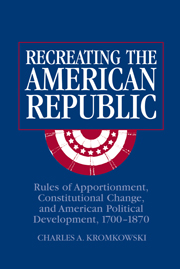 Recreating the American Republic
Recreating the American Republic Book contents
10 - Conclusions
Published online by Cambridge University Press: 14 July 2009
Summary
THE GREAT QUESTION which in all ages has disturbed mankind, and brought on them the greatest part of those mischiefs which have ruined cities, depopulated countries, and disordered the peace of the world, has been, not whether there be power in the world, not whence it came, but who should have it. The settling of this point being of no smaller moment than the security of princes and the peace and welfare of their estates and kingdoms, a reformer of politics. … should lay this sure and be very clear in it; for if this remain disputable, all the rest will be to very little purpose.
Lots of things depend on lots of things.
The preceding chapters offer detailed descriptions, explicit causal explanations, and a unifying theory that accounts for the creation and recreation of the American political order from 1700 to 1870. A comparative historical analysis of the conditions and decisions comprising three constitutional changes in the national rule of apportionment was the means employed for confronting and understanding the violent and consensual origins of this order in 1776, its peaceful transformation in 1787, and its ultimate breakdown and reconstruction after 1861. The first apportionment rule change studied began in the wake of the Declaration of Independence and culminated in 1781 with the formalization of the equal state apportionment rule in the Articles of Confederation.
- Type
- Chapter
- Information
- Recreating the American RepublicRules of Apportionment, Constitutional Change, and American Political Development, 1700–1870, pp. 422 - 434Publisher: Cambridge University PressPrint publication year: 2002


